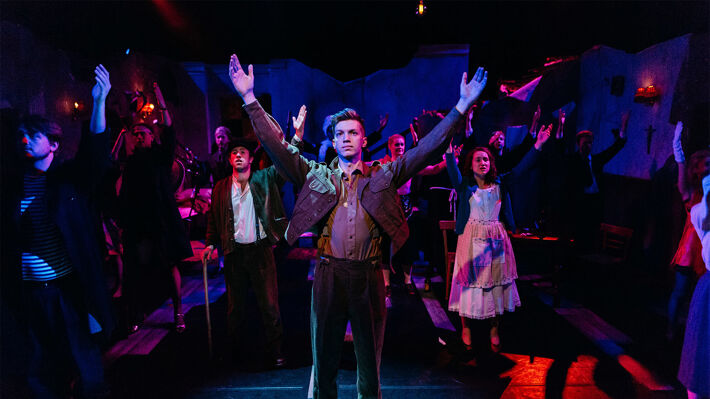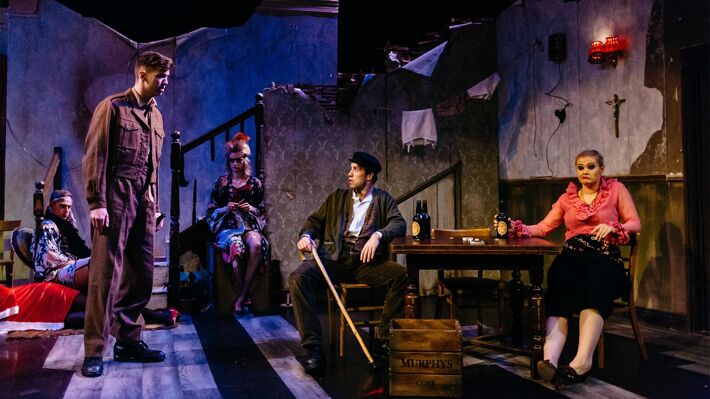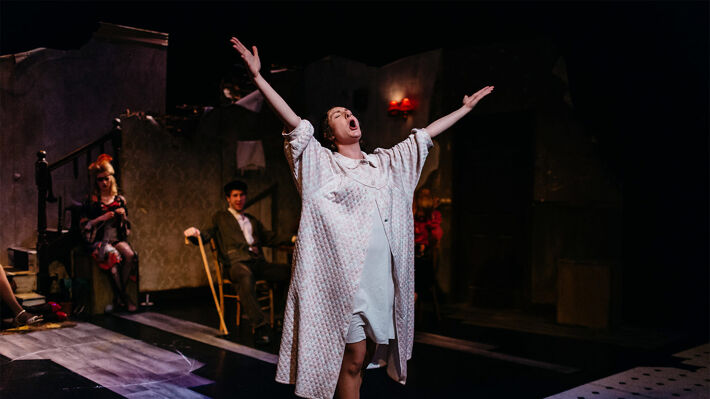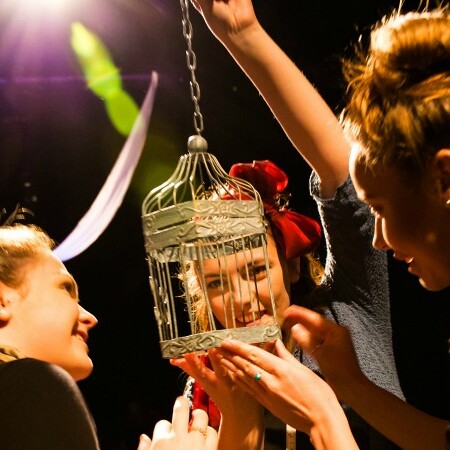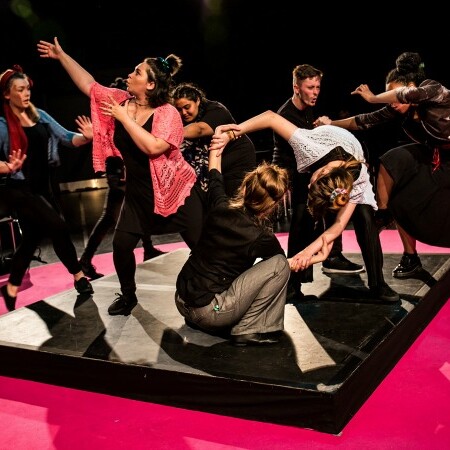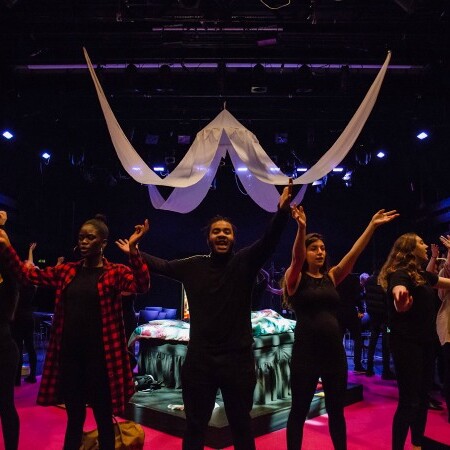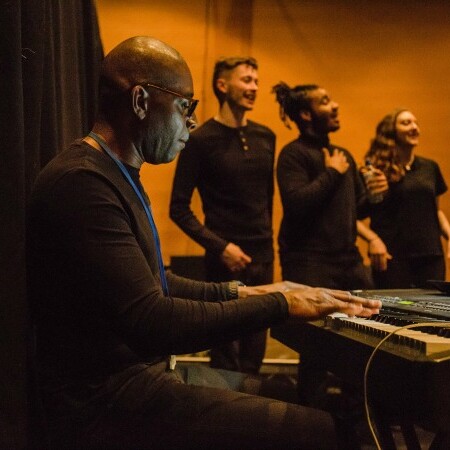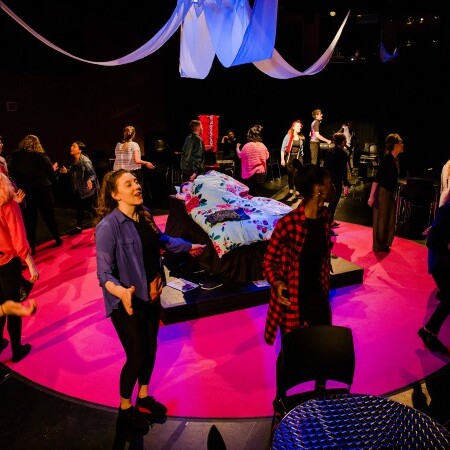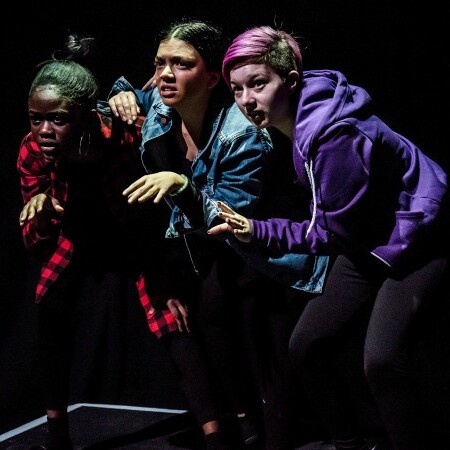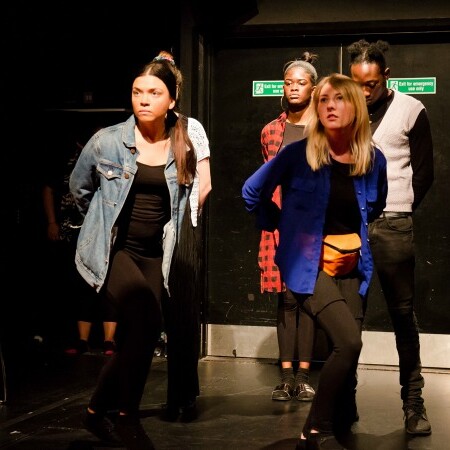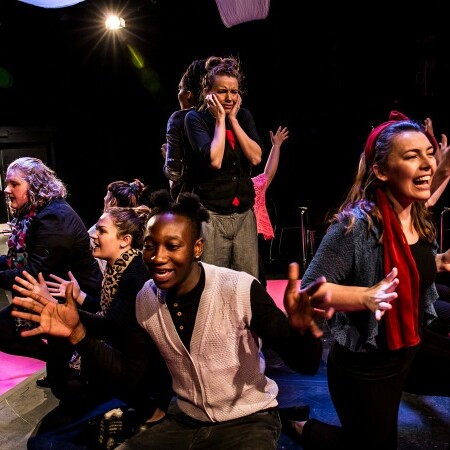Applied Theatre (Community and Education) - BA (Hons)
Currently viewing course to start in 2026/27 Entry.
Our BA (Hons) Applied Theatre aims to inspire the next generation of passionate and skilled theatre-makers. Our focus is on developing the skills and understanding needed to create compelling new performances and theatre projects with purpose. We are concerned not only with how we make theatre, but also why.
- Level Undergraduate
- Study mode Full Time
- Award BA (Hons)
- Start date September 2026
- Fees View course fees
- Subject
- Location RBC Digbeth / Bournville / City Centre
This course is:
Open to International Students
Overview
Our BA (Hons) Applied Theatre aims to inspire the next generation of passionate and skilled theatre-makers. Our focus is on developing the skills and understanding needed to create compelling new performances and theatre projects with purpose. We are concerned not only with how we make theatre, but also why.
What's covered in this course?
The majority of what you will learn through studying Applied Theatre will be through practical experience. You will bring the skills and passion you have, and learn how to apply them; as well as gaining new skills in facilitation, devising, and all aspects of theatre-making. You will not only be creating new drama, but gaining the knowledge and understanding needed to engage communities, and exploring the world in the wide variety of environments covered by the term Applied Theatre – such as schools, community or health centres, prisons, hospitals, or out on the streets.
Our strong industry links and on-going relationships with many experienced practitioners and companies working in the field allow us to prepare you for a varied career. As the course progresses, you will work increasingly independently, spending six weeks of the second year on a full-time placement, and in the third year collaborating with fellow students in forming professional ‘companies’, working collectively in live situations. The course ends with a festival of Applied Theatre, which serves as a showcase of your work and a bridge to a wide range of employment.
At Royal Birmingham Conservatoire we believe that creating theatre with social and political objectives can have a significant impact on the lives of individuals and communities. We use performance as a tool to explore the world, raise awareness, educate, empower, and instigate real and lasting change.
As an emerging practitioner we will supply you with artistic space, autonomy and choice. With a primary focus on performance, you will also explore the reasons behind the work looking at its history and theories while developing an understanding of the need for constant research, discussion, reflection and development of your practice.
Our professional partnerships
The course has strong partnerships with all of the major producing theatre companies in the Midlands, including Birmingham Repertory Theatre and Birmingham Hippodrome, with whom we regularly collaborate in the areas of Learning and Participation. We also have strong ongoing relationships with Open Theatre one of the UK's leading learning disabled theatre companies, and Geese Theatre, the ground-breaking prison theatre group. We also have long-term connections with Big Brum, Women and Theatre, Hanyong Theatre Company, Stans Café, Loudmouth and the Play House. All of these companies host our students on placements, run sessions in the University, invite us to events, and all of them provide employment for our graduates, in the knowledge that they will be getting students with a strong understanding of the work.
The course embraces students from a wide variety of performance backgrounds and actively encourages you to develop your own areas of interest and practice. Recent students have included spoken word artists, musicians/singers, dancers and those with interests as diverse as puppetry and arts administration. If you are passionate about the power of theatre, and you want to make your voice heard, this is definitely a course to consider.
Many students have gone on to work with one of the 50 small-scale and independent theatre companies in Birmingham, or elsewhere around the world, or to develop new companies, or pursue freelance work within Applied Theatre. Others have gone into other creative fields, or teaching or found that the skills they have gained on the course are transferrable across a wide range of work.
Why Choose Us?
- Top 5 in the UK for Drama and Dance (Guardian League Table 2025).
- You will be taught by a team which is as skilled and experienced as any teaching applied theatre in the UK. There are two full-time tutors who are supported by a range of professional staff, all with extensive knowledge, expertise and experience within Applied Theatre. Our team is made up of visiting tutors, and in-house lecturers, all of whom have and continue to work in industry.
- The course has many industry partners, providing you with fantastic opportunities to engage with other professionals and networks.
- You will benefit from actor training experiences within the Royal Birmingham Conservatoire alongside a contemporary Theatre-making curriculum, and the creation and presentation of regular public-facing performance projects.
- You will develop skills in drama facilitation, workshop leading and directing, working with a wide range of participants within school and community settings.
- An extended work placement module sits at the heart of the course, and you will engage and work closely with a professional organisation/host within the UK or overseas (e.g. a producing theatre, an independent touring company or a festival organiser) as a key part of your second year studies.
- Your course culminates in an industry-facing showcase platform, as you mount a festival of new theatre, and perform original productions alongside an exhibition of your wider applied projects and industry experiences.
Open Day
Join us on campus where you'll be able to explore our facilities and accommodation in person, and chat to staff and students from the Royal Birmingham Conservatoire.
Next Open Day: 4 December 2025
Entry Requirements
Essential requirements
96 UCAS Tariff points. Learn more about UCAS Tariff points.
Applicants will also need to complete an interview for this course; see interview arrangements below.
If you have a qualification that is not listed, please contact us.
Don’t meet our entry requirements?
You could apply for a foundation course or a course at our International College. These routes have lower entry requirements and act as the bridge to a full degree. To find out more, please select your status:
Fees & How to Apply
UK students
Annual and modular tuition fees shown are applicable to the first year of study. The University reserves the right to increase fees for subsequent years of study in line with increases in inflation (capped at 5%) or to reflect changes in Government funding policies or changes agreed by Parliament. View fees for continuing students.
Award: BA (Hons)
Starting: Sep 2026
- Mode
- Duration
- Fees
- Full Time
- 3 years
- £9,535 in 2026/27
- Apply via UCAS
International students
Annual and modular tuition fees shown are applicable to the first year of study. The University reserves the right to increase fees for subsequent years of study in line with increases in inflation (capped at 5%) or to reflect changes in Government funding policies or changes agreed by Parliament. View fees for continuing students.
Award: BA (Hons)
Starting: Sep 2026
- Mode
- Duration
- Fees
- Full Time
- 3 years
- £20,960 in 2026/27
- Apply via UCAS
Guidance for UK students
UK students applying for most undergraduate degree courses in the UK will need to apply through UCAS.
The Universities and Colleges Admissions Service (UCAS) is a UK organisation responsible for managing applications to university and college.
Applying through UCAS
- Register with UCAS
- Login to UCAS and complete your details
- Select your course and write a personal statement
- Get a reference
- Pay your application fee and submit your application
Guidance for International students
There are three ways to apply:
1) Direct to the University
You will need to complete our International Application Form and Equal Opportunities Form, and submit them together with scan copies of your original academic transcripts and certificates.
2) Through a country representative
Our in-country representatives can help you make your application and apply for a visa. They can also offer advice on travel, living in the UK and studying abroad.
3) Through UCAS
If you are applying for an undergraduate degree or a Higher National Diploma (HND), you can apply through the UK’s Universities and Colleges Admissions Service (UCAS).
You can request a printed form from your school or nearest British Council office. You will be charged for applying through UCAS. Birmingham City University’s UCAS code is B25 BCITY.
Personal statement
The personal statement gives you a crucial opportunity to say why you’re applying and why the institution should accept you.
Here are the three areas you’ll need to address:
- Why do you want to study this course or subject?
Here’s where you explain what makes this course exciting to you. Think about your motivations for studying the course and your future plans. If you’re planning to take a year out, don't forget to give your reasons.
- How have your qualifications and studies helped you to prepare for this course or subject?
This is your chance to show what you’ve learned at school or college. You should include the skills and knowledge you’ve gained from education or training and how this will help you succeed in your chosen course.
- What else have you done to prepare outside of education, and why are these experiences useful?
Not everything you’ve learned comes from the classroom. Life experience counts too! You might want to talk about work experience, employment, or volunteering and how they’ve helped you develop the skills needed for your chosen course or future career.
Worried about Personal Statements?
If you've got no idea where to start or just want to check you're on the right track, we’ve got expert advice and real examples from our students to help you nail your personal statement. You can even download our ultimate personal statement guide for free.

Financial Support
We offer further information on possible undergraduate financial support. This includes the type of loans, grants and scholarships available both from the government and from Birmingham City University.
Course in Depth
Year one
In order to complete this course a student must successfully complete all the following CORE modules (totalling 120 credits):
The module explores the range of work covered by the term, ‘Applied Theatre’, looking at its roots in political social and educational theatre, and tracing lines through to current provision.
Students will be given a directory of 60 small-scale theatre companies in the Birmingham area, and encouraged to make contacts and see work. Within the module there will be the opportunity to see work and work with some of these professional practitioners.
The module will cover the history and theory of Theatre-in-Education, introducing key practitioners, and exploring key texts. Looking at the roots of TIE in progressive education and in earlier theatre practice, the module will cover TIE practice from the first company at the Coventry Belgrade in the 1960s, through to current provision in the UK.
There will be an opportunity to see examples of professional Theatre-in-Education with local companies, and some timetabled discussion events, and there will be a practical approach to exploration of theories and methods, and some introductory skills sessions on facilitation and drama conventions.
The module will introduce Community Theatre, investigating the history and key philosophy of work of this kind. You will look at current practice through examination of the work of local companies, and will visit a community project, looking at the process of researching with a community, to create work responding to specific needs.
The assessment is through the creation of a group piece of performance [5 minutes] aimed at a specific community group, and a brief individual account – a short reflective commentary - placing the piece in the context of its intended audience, and the principles and practice of community theatre.
The 60 credit module takes place through the whole of Year One, and from week 10 of Semester Two it is the full-time activity. You will work with a tutor or professional practitioner as director, and collaborate to perform a new piece of theatre for a young audience, either from adapted or commissioned script or through a devising process. The play will be performed by the whole year group to a public audience.
Through the year you will have classes on performance skills [acting, singing movement voice and text] which as the play develops will shift from general classes into direct support for the piece.
Year two
In order to complete this course a student must successfully complete all the following CORE modules (totalling 120 credits):
The core of this module is the full-time professional placement in Semester 2.
You will be responsible for arranging a full-time placement in an applied theatre company, arts or education organisation, or appropriate related organisation, for a period of 6-8 weeks during Semester 2. You will be supported in making this placement, which can be in Birmingham, elsewhere in the UK or abroad. The placement needs to be full-time and related to the course.
Building on Drama for Learning 1, this module will expand your drama teaching and facilitation skills through practical application in live contexts.
You will add to your toolkit of drama conventions, exercises and approaches in a series of workshops, and you will then have an opportunity for an extended application of these skills, working with West Midlands Fire Service to create interactive workshops for school groups visiting the Safeside facility.
This module will look at a number of areas of Applied Theatre where a group or practitioner is working from a particular viewpoint, individual or collective, and explore the history, philosophy and themes of this work.
You will trace the origins of ‘political’ theatre in a range of movements, and look at key texts, and explore the issues raised by devising or writing around themes.
Continuing from the performance module in Year One, you will work in small groups to create a new piece of applied theatre and perform it to a specific target audience.
Initially exploring the process of devising, in a series of workshops you will then form small groups, and each group will use a devising process to create a new original piece. The piece will then be performed to its intended audience. Each group will be directed by an MA Student, tutor or professional practitioner, and will be responsible for researching, devising, rehearsing and performing the completed piece.
Year three
In order to complete this course a student must successfully complete all the following CORE modules (totalling 120 credits):
This module covers many of the practical aspects of working within the field of Applied Theatre. It is built around each student creating an Applied Theatre ‘project’ of your choice and compiling a full business plan for carrying it out. There is flexibility in the nature of the project, with students encouraged to consider their intentions after graduation, and create a resource of value to them. This could mean you work on something that you intend to do when leaving [for example a plan for setting up a company and carrying out a full-scale Applied Theatre performance project, or a plan for an individual freelance project offer] or it could be a hypothetical project, designed to explore wider issues around developing Applied Theatre practice, or to develop those areas and skills that you feel will be of most benefit to you [for example you could look at how a company might plan work in a specific community or country, or you might create a plan designed to assist a teacher in a term’s work with a particular class].
Each student will need to agree the scope of their plan with the module leader during individual tutorials, and further individual tutorials are available through the module, along with a range of sessions designed to explore careers and employment across the field.
The module follows from the previous Drama for Learning modules and takes the facilitation and drama skills you have learned to a professional level. In groups you will explore the role of a Learning and Participation team in a theatre and create work to accompany an existing production.
You will receive relevant inputs initially, including from professional practitioners, exploring the role of a Learning and Participation team in a theatre, digital and IT-based approaches, and also advanced workshop skills.
You will work for an extended period in a small group, running an extended project with a community group. [In previous years, projects have been run with older people, with young people with learning disabilities, with nurseries, with refugees] The division into groups, and the decision about the target community group will be made through meetings before the beginning of the academic year [i.e. at the end of Year 2] so that arrangements can be put in place. You will be appointed a professional practitioner as mentor and tutor for the project.
Early in Semester One you will produce a group plan with details of the aims and scope of the project. The group will research the needs of the chosen community, and construct an extended project, using appropriate Applied Theatre and drama approaches.
The final module of the Applied Theatre course consists of a Festival of Applied Theatre pieces, created by students. You will work in a small group, forming a ‘company’, and together devise, produce and perform a new original piece of applied theatre aimed at a specific ‘audience’. Each group will be mentored by a member of staff or visiting artist, and will be given a small budget for the production.
The Festival will take place in one building or area each year, and the company will be tasked with deciding how to use the space, so that the piece might be ‘site-specific’ or ‘site-responsive’ – taking account of the qualities of the place. The organisation of the Festival as a whole, including arrangements for ticketing, marketing and technical support, will be in the hands of the companies, with this process being mentored by an industry professional. The Festival will also house an exhibition of the Personal Projects and examples of Community Project work, and serve as a showcase of your work for invited professional practitioners.
Download course specification
Download nowHow you learn
Learn through experience and transform from student to practitioner while developing your own style of creative practice. By working in partnership with your tutors, and increasingly independently, you will identify and undertake the roles of performer, deviser, performance maker and facilitator and work with a strong range of artists and companies along the way.
You’ll be provided with a supportive environment where you can truly excel – becoming the very best you can be. We embrace students from a wide variety of performance backgrounds and actively encourage you to develop your own areas of interest and practice. Recent students have included spoken word artists, musicians, singers, dancers and those with interests as diverse as puppetry and arts administration. You’ll learn by doing, through creating new work, and you will acquire the skills, knowledge and understanding needed to work in the diverse field of work covered by the term Applied Performance: including theatre in education, health, prisons and hospitals, community theatre, or out on the streets. You will regularly work away from the Conservatoire, with young people, community groups and a wide range of participants.
If you are passionate about the power of theatre, and you want to make your voice heard, this is the course for you.
Professional Experience
In your second year you will spend six to eight weeks on placement with theatre groups, community groups or schools, in the UK or abroad, as part of the Professional Practice module.
Students have undertaken placements with: West Yorkshire Playhouse, Big Brum, The Playhouse, Women and Theatre, mac Birmingham, Loudmouth, Talking Birds, BeatFreaks, Birmingham Repertory Theatre, Chickenshed, Birmingham Hippodrome, Pines Special Needs School, The Lyric Hammersmith, Greenwich Young People’s Theatre and Soho Theatre and Writer’s Centre.
The placement aspect of this course is designed to allow you to gain authentic experience of a working creative company or organisation, as well as acting as an excellent networking opportunity. You will be expected to develop a comprehensive, hands-on understanding of the administrative requirements of a company, including suitable sources of financial support, or different types of investment that are relevant within a professional environment.
Trips and Visits
While there are not any timetabled trips or visits within this course you will be expected to facilitate and attend several visits as an aspect of community engagement. These visits are integrated within your modules and you will be assessed on how they contribute to your overall piece of work for the module in question.
In most cases you will work collaboratively within a group to organise these visits, at times you will be expected to deliver workshops within a community visit. It is advisable that as a student you engage as much as possible with activities and events that relate to your desired profession. Birmingham Conservatoire (Acting) frequently produces performances in venues across the city throughout the year.
We recommend you attend these performances not only to familiarise yourself with the Birmingham performing arts industry, but to network and broaden your knowledge.

Hear more about the course from our students
Our Twitter/X page is a great way to a get another insight into BA (Hons) Applied Theatre (Community and Education). You can also see all the latest news from the course.
Where our students go
Our students have gone on to work with companies such as:
- The Playhouse
- Birmingham Rep
- Razzmatazz
And in jobs such as:
- Actor- Teacher
- Youth Theatre Director
- Community Drama Leader
Or continue their studies, with many choosing to take teaching qualifications and move into the formal education sector.
Employability
Enhancing your employability
Throughout the programme you will develop both personally and professionally, graduating as a fully-trained applied performance practitioner. You will develop the necessary knowledge, understanding and skill to develop a career within applied performance, and further afield. This course will give you the space to nurture and develop your talent, providing you with the skill to operate with reflective, specialist awareness.
An understanding of the relationship between theory and practice will be developed through exploration of a range of cultural and theoretical discourses. Establishing your research, academic, discussion and creative presentation skills you will develop confidence and competency in delivering work. You will establish yourself as a well-informed practitioner by developing an in-depth knowledge and understanding of the contexts and histories of applied performance, theatre and drama.
The practical skills you’ll develop will allow you to make interdisciplinary, original work, catering to the needs of specific audiences. You will be able to work collaboratively to devise and write performances. In addition to this you will nurture your ability to plan, write, develop and facilitate workshops for groups, catering to different needs and contexts.
You will learn a range of applied performance practical skills and methodologies appropriate to practice within community and educational contexts. Collaboration, leadership, communication, professionalism, and administration skills within professional contexts will be developed throughout the programme. This programme is designed with the purpose of encouraging you to realise your talent and skill. Through intensive work, and creative exploration you will develop versatility and a proactive attitude. You’ll graduate with the ability to take on numerous roles, particularly through the development of a specific set of skills.
Placements
We work closely with performance companies to offer placement opportunities and visit students during their time on the course. Some of our associate visiting companies and placement providers include:
- Big Brum
- Open Theatre
- The Rep
- The Playhouse
- Stan’s Café
- Women & Theatre
Further study
Graduates of this course develop essential skills and knowledge required for further study. If you wish to develop your studies to the next level, this course will give you the confidence and advanced scholarly knowledge required for a Master’s degree within the arts.
The course seeks to advance your knowledge, understanding and of Applied Theatre, focusing on community and education. You will develop a theoretical and practical knowledge which can be applied to further study within the field.
A number of graduates also go on to a postgraduate qualification in teaching, sometimes for Primary, others for Secondary Drama, as they are able to draw on the skills and experience in workshop facilitation they develop as part of the Applied Theatre course.
Facilities & Staff
Our Facilities
Applied Theatre students are primarily based in our new teaching space in Birmingham’s Creative Quarter, Digbeth, which is just a short walk from the University’s City Centre campus. Split across two floors, our RBC Digbeth space features four purpose-built studios that are used for practical workshops, rehearsals, theatre-making projects, and performances.
You will also have some voice and movement classes at Ruskin Hall in the idyllic location of Bournville, south Birmingham, near to Cadbury World, Stirchley, and the student community in Selly Oak. Facilities include rehearsal and teaching spaces, a resource room with a range of plays, and a student common room.
We use professional external venues for public performances, including the Joint Stock Theatre, the Patrick Centre at Birmingham Hippodrome, (all subject to availability), which means you will benefit from regular opportunities to perform in theatres around the city, along with community venues and locations for Site-Specific projects.
You will also get the opportunity to use the facilities we enjoy through being part of Birmingham City University. For example, the Parkside Building at our City Centre campus houses TV and radio studios and a giant green screen, giving you varied experience that covers stage, screen and radio techniques depending on project focus.
Performances
Students regularly perform at professional theatres across the West Midlands, including The Birmingham Central Library Theatre; Crescent Theatre; Hippodrome Studio (Patrick Centre); The Old Rep Theatre and The Drum.
